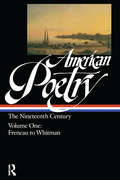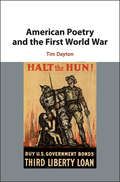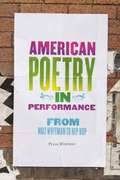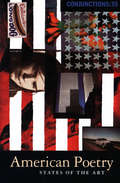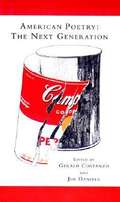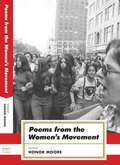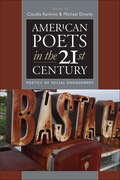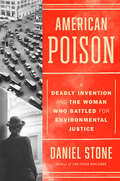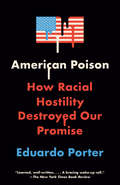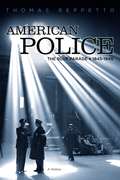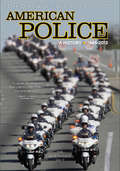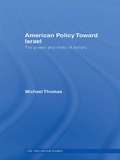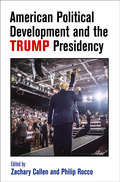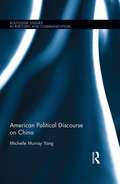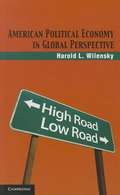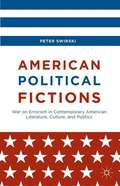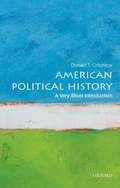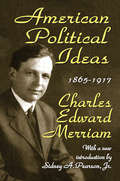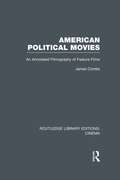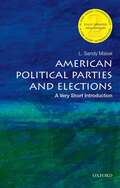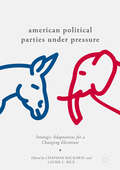- Table View
- List View
American Poetic Materialism from Whitman to Stevens
by Mark NobleIn American Poetic Materialism from Whitman to Stevens, Mark Noble examines writers who rethink the human in material terms. Do our experiences correlate to our material elements? Do visions of a common physical ground imply a common purpose? Noble proposes new readings of Walt Whitman, Ralph Waldo Emerson, William James, George Santayana and Wallace Stevens that explore a literary history wrestling with the consequences of its own materialism. At a moment when several new models of the relationship between human experience and its physical ground circulate among critical theorists and philosophers of science, this book turns to poets who have long asked what our shared materiality can tell us about our prospects for new models of our material selves.
American Poetry 19th Century 2: The Library Of America Anthology (Library Of America: The American Poetry Anthology Ser.the\library Of America #2)
by John HollanderFirst Published in 2004. Routledge is an imprint of Taylor & Francis, an informa company.
American Poetry after Modernism
by Albert GelpiAlbert Gelpi's American Poetry after Modernism is a study of sixteen major American poets of the postwar period, from Robert Lowell to Adrienne Rich. Gelpi argues that a distinctly American poetic tradition was solidified in the later half of the twentieth century, thus severing it from British conventions. In Gelpi's view, what distinguishes the American poetic tradition from the British is that at the heart of the American endeavor is a primary questioning of function and medium. The chief paradox in American poetry is the lack of a tradition that requires answering and redefining - redefining what it means to be a poet and, likewise, how the words of a poem create meaning, offer insight into reality, and answer the ultimate questions of living. Through chapters devoted to specific poets, Gelpi explores this paradox by providing an original and insightful reading of late-twentieth-century American poetry.
American Poetry and the First World War
by Tim DaytonAmerican Poetry and the First World War connects American poetry to the political and economic forces behind American participation in World War I. Dayton investigates the ways that poetry was used to imagine the war and studies a wide range of poetry: open and closed form, formal and colloquial, well-known and unknown. In a chapter on Edith Wharton, Dayton demonstrates that many of the features of poetry also found expression in prose about the war. Seeing the war as the opening bid in American ascent to global hegemony, Dayton unlocks some of the ways that literature provided a means by which to accept - and occasionally contest - the price to be paid for power. American Poetry and the First World War draws on a wide range of reading in the primary texts of the period, archival research, historical materialist theory, and work in political and economic history and international relations.
American Poetry in Performance: From Walt Whitman to Hip Hop
by Tyler Hoffman"Tyler Hoffman brings a fresh perspective to the subject of performance poetry, and this comes at an excellent time, when there is such a vast interest across the country and around the world in the performance of poetry. He makes important connections, explaining things in a manner that remains provocative, interesting, and accessible. " ---Jay Parini, Middlebury College American Poetry in Performance: From Walt Whitman to Hip Hop is the first book to trace a comprehensive history of performance poetry in America, covering 150 years of literary history from Walt Whitman through the rap-meets-poetry scene. It reveals how the performance of poetry is bound up with the performance of identity and nationality in the modern period and carries its own shifting cultural politics. This book stands at the crossroads of the humanities and the social sciences; it is a book of literary and cultural criticism that deals squarely with issues of "performance," a concept that has attained great importance in the disciplines of anthropology and sociology and has generated its own distinct field of performance studies. American Poetry in Performance will be a meaningful contribution both to the field of American poetry studies and to the fields of cultural and performance studies, as it focuses on poetry that refuses the status of fixed aesthetic object and, in its variability, performs versions of race, class, gender, and sexuality both on and off the page. Relating the performance of poetry to shifting political and cultural ideologies in the United States, Hoffman argues that the vocal aspect of public poetry possesses (or has been imagined to possess) the ability to help construct both national and subaltern communities. American Poetry in Performance explores public poets' confrontations with emergent sound recording and communications technologies as those confrontations shape their mythologies of the spoken word and their corresponding notions about America and Americanness.
American Poetry: States of the Art (Conjunctions #35)
by Bradford MorrowWith work from the seventy-five poets who are the game-changing, bar-setting voices of our time first published in this volume, Conjunctions: 35, American Poetry is the definitive collection for the contemporary poetic landscape. Includes astonishing uncollected work from masters of the form, as well as breathtaking new ventures from risk takers such as Juliana Spahr and Kevin Young. Contributors include John Ashbery, Susan Wheeler, and James Tate.
American Poetry: The Next Generation
by Jim Daniels Gerald CostanzoThis book is an anthology of the many young poets, all born since 1960.
American Poets Project: Poems from the Women's Movement
by Honor MooreTHE WOMEN’S MOVEMENT OF THE 1960s, 70s, AND 80s generated an extraordinary outpouring of poetry that captured an age of expectancy, of defiant purpose, and exuberant exploration. Here, brought together for the first time, are the poems that gave voice to a revolution, including works by Sylvia Plath, Adrienne Rich, Muriel Rukeyser, Anne Sexton, Sonia Sanchez, Lucille Clifton, May Swenson, Alice Walker, Anne Waldman, Sharon Olds, and many others.
American Poets in the 21st Century: Poetics of Social Engagement (American Poets In The 21st Century Ser.)
by Claudia Rankine and Michael DowdyPoetics of Social Engagement emphasizes the ways in which innovative American poets have blended art and social awareness, focusing on aesthetic experiments and investigations of ethnic, racial, gender, and class subjectivities. Rather than consider poetry as a thing apart, or as a tool for asserting identity, this volume's poets create sites, forms, and modes for entering the public sphere, contesting injustices, and reimagining the contemporary. Like the earlier anthologies in this series, this volume includes generous selections of poetry as well as illuminating poetics statements and incisive essays. This unique organization makes these books invaluable teaching tools. A companion website will present audio of each poet's work.Poets included:Rosa AlcaláBrian BlanchfieldDaniel BorzutzkyCarmen Giménez SmithAllison Hedge CokeCathy Park HongChristine HumeBhanu KapilMauricio Kilwein GuevaraFred MotenCraig Santos PerezBarbara Jane ReyesRoberto TejadaEdwin TorresEssayists included: John Alba CutlerChris NealonKristin DykstraJoyelle McSweeneyChadwick AllenDanielle PafundaMolly BendallEunsong KimMichael DowdyBrent Hayes EdwardsJ. Michael MartinezMartin Joseph PonceDavid ColónUrayoán Noel
American Poison: A Deadly Invention and the Woman Who Battled for Environmental Justice
by Daniel StoneFrom the national bestselling author of The Food Explorer comes the untold story of Alice Hamilton, a trailblazing doctor and public health activist who took on the booming auto industry—and the deadly invention of leaded gasoline, which would poison millions of people across America. At noon on October 27, 1924, a factory worker was admitted to a hospital in New York City, suffering from hallucinations and convulsions. Before breakfast the next day, he was dead. Alice Hamilton was determined to prevent such a tragedy from happening again. By the time of the accident, Hamilton had pioneered the field of industrial medicine in the United States. She specialized in workplace safety years before the Occupational Safety and Health Administration was created. She was the first female professor at Harvard. She spent decades inspecting factories and mines. But this time, she was up against a formidable new foe: America&’s relentless push for progress, regardless of the cost. The 1920s were an exciting decade. Industry was booming. Labor was flourishing. Automobiles were changing roads, cities, and nearly all parts of American life. And one day, an ambitious scientist named Thomas Midgley Jr. triumphantly found just the right chemical to ensure that this boom would continue. His discovery—tetraethyl leaded gasoline—set him up for great wealth and the sort of fame that would land his name in history books. Soon, Hamilton would be on a collision course with Midgley, fighting full force against his invention, which poisoned the air we breathe, the water we drink, and the basic structure of our brains. American Poison is the gripping story of Hamilton&’s unsung battle for a healthy planet—and the ramifications that continue to echo today.
American Poison: How Racial Hostility Destroyed Our Promise
by Eduardo PorterA sweeping examination of how American racism has broken the country's social compact, eroded America's common goods, and damaged the lives of every American--and a heartfelt look at how these deep wounds might begin to heal.Compared to other industrialized nations, the United States is losing ground across nearly every indicator of social health. Its race problem, argues Eduardo Porter, is largely to blame.In American Poison, the New York Times veteran shows how racial animus has stunted the development of nearly every institution crucial for a healthy society, including organized labor, public education, and the social safety net. <P><P>The consequences are profound and are only growing graver with time. <P><P>Leading us through history and across America--from FDR's New Deal through Bill Clinton's welfare reform to Donald Trump's retrograde and divisive policies--Porter pieces together how racial hostility has blocked American social cohesion at every turn, producing a nation that fails not only its black and brown citizens but white Americans as well. American Poison is at once a broad, rigorous argument, and a profound cri de coeur. Even as it uncovers our most tenacious national pathology, it points the way toward hope, illuminating the ways in which, as the nation becomes increasingly diverse, it may well be possible to construct a new understanding of racial identity--and a more cohesive society on top of it.
American Police
by Thomas A. ReppettoFrom its beginnings in eighteenth-century London, this is the history of the largest urban police departments in the United States and a social portrait of America during the first century of its existence. From the birth of the New York City Police Department in 1845 to the end of World War II, each city had its share of crime, murders, vice, drug dealers, and addicts.Boston, New York, Chicago, Philadelphia, San Francisco, and Los Angeles each had their own history and developed in different ways according to local realities. But in every case, each police department had to deal with its share of good and bad cops, Pinkertons, gangsters, revolutionists, politicians, reporters, muckrakers, arsonists, murderers, district attorneys, strikers, labor spies, hanging judges, and axe-swinging crusaders, as well as every conceivable element of American society high and low.But American Police also offers a view of the FBI and its legendary director, J. Edgar Hoover; District Attorney Earl Warren and police commissioners such as Teddy Roosevelt, Stephen J. O'Meara, Richard Enright, Grover Whalen, Louis J. Valentine, and August Vollmer; and tough cops like Captain William "Clubber" Williams, Johnny "the Boff" Broderick, and John Cordes.It is also the history of crime over the course of a century that transformed the United States from a former colony of the British Empire to a powerful and restless nation poised for spectacular growth.Thomas A. Reppetto, a former commander of detectives, is the author of NYPD and American Mafia.
American Police, A History: 1945-2012
by Thomas A. ReppettoPostwar America saw few changes to law enforcement in one hundred years. The little known San Francisco riot of August 1945 announced the violent events of the next half century. Most of the methods remained unchanged until the 1953 kidnapping of Bobby Greenlease in Kansas City, Missouri, that shook the country. The 1960s were dominated by civil rights struggles and major riots. Watts, Detroit, and Newark demonstrated how local police departments were unable to handle the disorders that engulfed those cities. The anti-war protest at the 1968 Chicago Democratic Convention is important to this narrative since the author was in charge of convention security. The police department was split on how to deal with the protestors: a major revelation of this book. The author also turned down an offer to become part of a unit later known as the "plumbers" made to him personally by Attorney General John Mitchell. The 1970s and '80s are the lowest points in modern American law enforcement until the emergence of "zero tolerance" by New York Commissioner William Bratton and Mayor Rudy Giuliani. 9/11 changes the landscape with the new focus on counter terror and new challenges to law enforcement. Thomas Reppetto began as a police officer, rising to Commander of Detectives in the Chicago Police Department. In 1970 he received a PhD in public administration from the Harvard School of Government. He taught at the John Jay College of the City University of New York and became dean of graduate studies, then vice president. He is retired and lives in the New York City area.
American Policy Toward Israel: The Power and Limits of Beliefs (LSE International Studies Series)
by Michael ThomasThis book explains the institutionalization of nearly unconditional American support of Israel during the Reagan administration, and its persistence in the first Bush administration in terms of the competition of belief systems in American society and politics. Michael Thomas explains policy changes over time and provides insights into what circumstances might lead to lasting changes in policy. The volume identifies the important domestic, social, religious and political elements that have vied for primacy on policy towards Israel, and using case studies, such as the 1981 AWACS sale and the 1991 loan guarantees, argues that policy debates have been struggles to embed and enforce beliefs about Israel and about Arabs. It also establishes a framework for better understanding the influences and constraints on American policy towards Israel. An epilogue applies the lessons learned to the current Bush administration. American Policy toward Israel will be of interest to students of US foreign policy, Middle Eastern politics and international relations.
American Political Cartoons: From 1754 to 2010
by Sandy NorthropFrom Benjamin Franklin's drawing of the first American political cartoon in 1754 to contemporary cartoonists' blistering attacks on George W. Bush and initial love-affair with Barack Obama, editorial cartoons have been a part of American journalism and politics. American Political Cartoons chronicles the nation's highs and lows in an extensive collection of cartoons that span the entire history of American political cartooning."Good cartoons hit you primitively and emotionally," said cartoonist Doug Marlette. "A cartoon is a frontal attack, a slam dunk, a cluster bomb." Most cartoonists pride themselves on attacking honestly, if ruthlessly. American Political Cartoons recounts many direct hits, recalling the discomfort of the cartoons' targets and the delight of their readers.Through skillful combination of pictures and words, cartoonists galvanize public opinion for or against their subjects. In the process they have revealed truths about us and our democratic system that have been both embarrassing and ennobling. Stephen Hess and Sandy Northrop note that not all cartoonists have worn white hats. Many have perpetuated demeaning ethnic stereotypes, slandered honest politicians, and oversimplified complex issues.
American Political Development and the Trump Presidency (American Governance: Politics, Policy, and Public Law)
by Zachary Callen Philip RoccoIn virtually all respects, the Trump presidency has disrupted patterns of presidential governance. However, does Trump signify a disruption, not merely in political style but in regime type in the United States? Assessing Trump's potential impact on democratic institutions requires an analysis of how these institutions—including especially the executive branch—have developed over time as well as an examination of the intersecting evolution of political parties, racial ideologies, and governing mechanisms. To explore how time and temporality have shaped the Trump presidency, editors Zachary Callen and Philip Rocco have brought together scholars in the research tradition of American political development (APD), which explicitly aims to consider how interactions between a range of institutions result in the shifting of power and authority in American politics, with careful attention paid to complex processes unfolding over time. By focusing on the factors that contribute to both continuity and change in American politics, APD is ideally situated to take a long view and help make sense of the Trump presidency.American Political Development and the Trump Presidency features contributions by leading political scientists grappling with the reasons why Donald Trump was elected and the meaning of his presidency for the future of American politics. Taking a historical and comparative approach—instead of viewing Trump's election as a singular moment in American politics—the essays here consider how Trump's election coincides with larger changes in democratic ideals, institutional structures, long-standing biases, and demographic trends. The Trump presidency, as this volume demonstrates, emerged from a gradual unsettling of ideational and institutional lineages. In turn, these essays consider how Trump's disruptive style of governance may further unsettle the formal and informal rules of American political life.Contributors: William D. Adler, Gwendoline Alphonso, Julia R. Azari, Zachary Callen, Megan Ming Francis, Daniel J. Galvin, Travis M. Johnston, Andrew S. Kelly, Robert C. Lieberman, Paul Nolette, Philip Rocco, Adam Sheingate, Chloe Thurston.
American Political Discourse on China (Routledge Studies in Rhetoric and Communication)
by Michelle Murray YangDespite the U.S. and China’s shared economic and political interests, distrust between the nations persists. How does the United States rhetorically navigate its relationship with China in the midst of continued distrust? This book pursues this question by rhetorically analyzing U.S. news and political discourse concerning the 2008 Beijing Olympic Games, the 2010 U.S. midterm elections, the 2012 U.S. presidential election, and the 2014-2015 Chinese cyber espionage controversy. It finds that memory frames of China as the yellow peril and the red menace have combined to construct China as a threatening red peril. Red peril characterizations revive and revise yellow peril tropes of China as a moral, political, economic and military threat by imbuing them with anti-communist ideology. Tracing the origins, functions, and implications of the red peril, this study illustrates how historical representations of the Chinese threat continue to limit understanding of U.S.-Sino relations by keeping the nations’ relationship mired in the past.
American Political Economy (2nd Edition)
by John T. MolloyWhy write a textbook called American Political Economy? What is American Political Economy, and how does it differ from American Government or Economics? These are logical questions which may come to mind as students begin their journey through these pages.
American Political Economy in Global Perspective
by Harold L. WilenskyThis book is a guide to claims about the proper role of government and markets in a global economy. Moving between systematic comparison of nineteen rich democracies and debate about what the United States can do to restore a more civilized, egalitarian and fair society, Harold L. Wilensky tells us how six of these countries got on a low road to economic progress and which components of their labor-crunch strategy are uniquely American. He provides an overview of the impact of major dimensions of globalization, only one of which - the interaction of the internationalization of finance and the rapid increase in the autonomy of central banks - undermines either national sovereignty or job security, labor standards, and the welfare state. Although Wilensky views American policy and politics through the lens of globalization, he concludes that the nation-state remains the center of personal identity, social solidarity and political action.
American Political Fictions
by Peter SwirskiAmerican Political Fictions rewrites the book on American political art in a myth-busting study that ranges from historical 'faction' and apocalyptic thrillers to satirical fiction, rap poetry, TV'sThe West Wing, and not least the make-believe that streams out of the White House. It critically, not to say skeptically, sieves out historical facts from a sea of partisan and bipartisan disinformation in order to forge a more accurate picture of contemporary American culture and, through it, of America itself. In the process, it elucidates the ideological underpinnings, cultural manifestations, and democratic essence of contemporary political art - and of the partisan politics on which it feeds.
American Political History: A Very Short Introduction
by Donald T. CritchlowThis brief, accessible book explores the nature of the two-party system, key turning points in American political history, representative presidential and congressional elections, struggles to expand the electorate, and critical social protest and third-party movements.
American Political Ideas, 1865-1917
by Charles MerriamCharles Merriam is scarcely read today, and even among scholars he is probably more often cited than read seriously. His ambiguous position in the study of American democracy is unfortunate. Between the two world wars, Merriman was the doyen of American political science. This was a period when the most formative characteristics of academic social sciences were taking shape, characteristics that were to dominate the remainder of the century. During this period, "science" and "progress" became virtually synonymous in the social sciences. Between the two world wars, the liberal progressive critique of America's founders, a critique that included scholars such as Woodrow Wilson, Charles Beard, and others, became the orthodoxy of a new political science. The heart of that critique, insofar as it turned on methodological questions of how to study American government, was very much the work of Charles Merriam. Anyone who seeks to understand why that period was so pivotal in the interpretation of American democracy must necessarily study Charles Merriam and his influence. His work represents the first comprehensive effort by a scholar in the liberal-progressive tradition to survey the entirety of American political thought. To read Merriam's political essays and writings is to read a political theory that the behavioral tradition would come to label as "normative." His essays included insightful interpretations of Hobbes and Rousseau in European political philosophy as well as an earlier work tracing American political thought from the founding to the Civil War. This is a fundamental work for scholars working in the liberal-progressive tradition.
American Political Movies: An Annotated Filmography of Feature Films (Routledge Library Editions: Cinema)
by James CombsEssays here explore the relationship between politics and explicitly political feature films from the beginning of the movie industry to World War I, and for each decade through to the 1980's. The included filmography is particularly useful. Originally published in 1990, the method of inquiry put forward in this text is nonetheless extendable to the decades following its publication.
American Political Parties And Elections: A Very Short Introduction (Very Short Introductions Ser.)
by L. Sandy MaiselFew Americans and even fewer citizens of other nations understand the electoral process in the United States. Still fewer understand the role played by political parties in the electoral process or the ironies within the system. Participation in elections in the United States is much lower than in the vast majority of mature democracies. Perhaps this is because of the lack of competition in a country where only two parties have a true chance of winning, despite the fact that a large number of citizens claim allegiance to neither and think badly of both. Or perhaps it is because in the U.S. campaign contributions disproportionately favor incumbents in most legislative elections, or that largely unregulated groups such as the now notorious 527s have as much impact on the outcome of a campaign as do the parties or the candidates' campaign organizations. These factors offer a very clear picture of the problems that underlay our much trumpeted electoral system. The second edition of this Very Short Introduction introduces the reader to these issues and more. Drawing on updated data and new examples from the 2016 presidential nominations, L. Sandy Maisel provides an insider's view of how the system actually works while shining a light on some of its flaws. He also illustrates the growing impact of campaigning through social media, the changes in campaign financing wrought by the Supreme Court recent decisions, and the Tea Party's influence on the sub-presidential nominating process. As the United States enter what is sure to be yet another highly contested election year, it is more important than ever that Americans take the time to learn the system that puts so many in power.
American Political Parties Under Pressure: Strategic Adaptations for a Changing Electorate
by Chapman Rackaway Laurie L. RiceThis book addresses the changing electoral and political circumstances in which American political parties found themselves during the 2016 election, and the strategic adaptations this new pressure may require. The respective establishments of both major political parties have found themselves facing serious challenges. Some observers wondered if realignment was in progress, and whether the parties could survive. Both grounded in research and accessible to more than just academics, this book provides important insights into how political parties can move forward from 2016.

